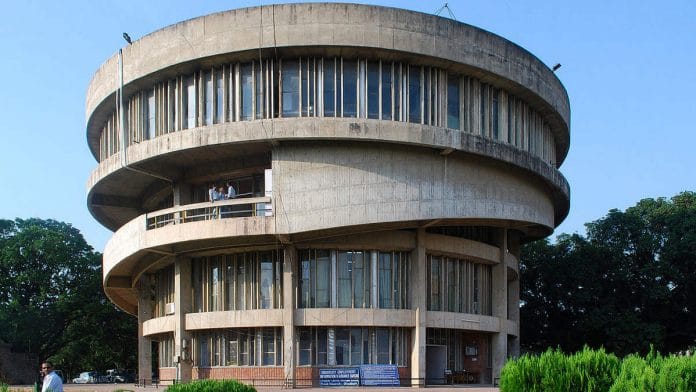New Delhi: Days after the Chhatra Yuva Sangharsh Samiti (CYSS), the student wing of the Aam Aadmi Party, won the race for the president’s post in the Panjab University Campus Students Council (PUCSC) elections earlier this week, opinion continues to be divided on whether the CYSS had really managed to sweep the polls.
“Traditionally, there used to be two student groups which would fight elections — Panjab University Students Union (PUSU) and Students Organisation of Panjab University (SOPU). But over the years they faded away from the mainstream and traditional political parties started fielding their candidates. ABVP has never been able to win substantially in the student elections. The CYSS has only one presidential post, rest of the seats have gone to NSUI and INSO, which also fought in alliance with ABVP,” said former president of Panjab University Teachers Association (PUTA) and professor of political science at the university, Mohammed Khalid.
Elections for PUCSC officer bearers were held Tuesday and results were announced the same day. CYSS candidate Ayush Khatkar won the polls for the president’s post by a margin of 660 votes, defeating ABVP-led alliance candidate Harish Gujjar. Gurwinder Singh, National Students Union of India (NSUI, the students arm of the Congress) candidate, stood in third position.
CYSS, which AAP had floated in Chandigarh in 2020 with 12 members, was also the second favourite for the post of joint secretary, which it fought in alliance with the Indian Students’ Association.
While NSUI bagged the positions of vice president and joint secretary, the INSO-ABVP candidate won the secretary’s post. INSO (Indian National Student Organisation) is an affiliate of the Jananayak Janata Party (JJP).
This year’s PUCSC elections come after a gap of two years during which polls were not held owing to the Covid pandemic. On Tuesday, elections were held at the Panjab University’s main campus in Chandigarh, as well as at 15 other affiliated colleges of the university. However, the students contesting in affiliated colleges are not necessarily affiliated to a political organisation, said Khalid.
While the CYSS received 27.06 per cent of vote share for the post of president, the ABVP got 20.48 per cent, and the NSUI 15.78 per cent of votes.
“The CYSS only fought on the president’s seat independently, and fought in alliance for the post of joint secretary. But the post of president is the prominent post, and the most important among all. This is a commendable performance for a debut election. Even though it was a small margin of victory, giving a neck-to-neck fight to an established party is no small feat,” said Panjab University’s political science professor Ronki Ram.
Also read: IIT prof, TV anchor, ‘one-man army’ — who are the men leading AAP campaign in Gujarat & Himachal
‘Restart election in other universities’
According to Khalid, the winning candidate’s department and his previous political affiliations played a role in the elections. Khatkar was a member of the ABVP till 2019. He joined the CYSS after the farmers’ protests against the now-repealed farm bills.
“The student who won the presidential post, also came from the ABVP. In Panjab University, two departments have major chunks of votes, the UIET (University Institute of Engineering and Technology) which has over 2,000 votes and UILS (University Institute of Legal Studies) which has over 1,700 votes. The CYSS candidate came from UILS, so he got over 1,300 votes from just one department (UILS) itself,” said Khalid.
Political experts are also connecting his win to influence of the Bhagwant Mann-led AAP government in power in the state.
“It is an indication of AAP’s expanding influence. Punjab also has had the trend during general elections of giving chance to political alternatives. Secondly, the students thought that the state also has an AAP government, so let us give them a chance in the university elections also. It is advantageous for the student council to have a president affiliated to the ruling parties for more funds. The CYSS presidential candidate was also seen promising that he will try to bring in more funds for the university,” said Ram.
According to Khalid, if AAP really wanted to dip its feet into student politics, it needed to restart elections in other universities of Punjab.
“Because the winning candidate is from CYSS and AAP also recently won in Punjab, naturally it is a reason for them to celebrate and interpret it as a message for AAP”s upcoming political fortune. But if AAP really wants to enter into student politics, it needs to start elections in other universities in Punjab which stopped after the 1984 riots. I read only one message from the recent election, that student politics in Punjab has become more diversified,” he said.
While students union elections were discontinued in colleges affiliated to Panjab University, Chandigarh, Punjabi University, Patiala, and Guru Nanak Dev University, Amritsar, in 1984, elections at the PU campus in Chandigarh and its colleges resumed 1997. Student polls in other universities remain suspended, however.
(Edited by Poulomi Banerjee)
Also read: ‘Conversions caused by oppression, India should take Buddha’s path,’ says AAP ex-minister Gautam






